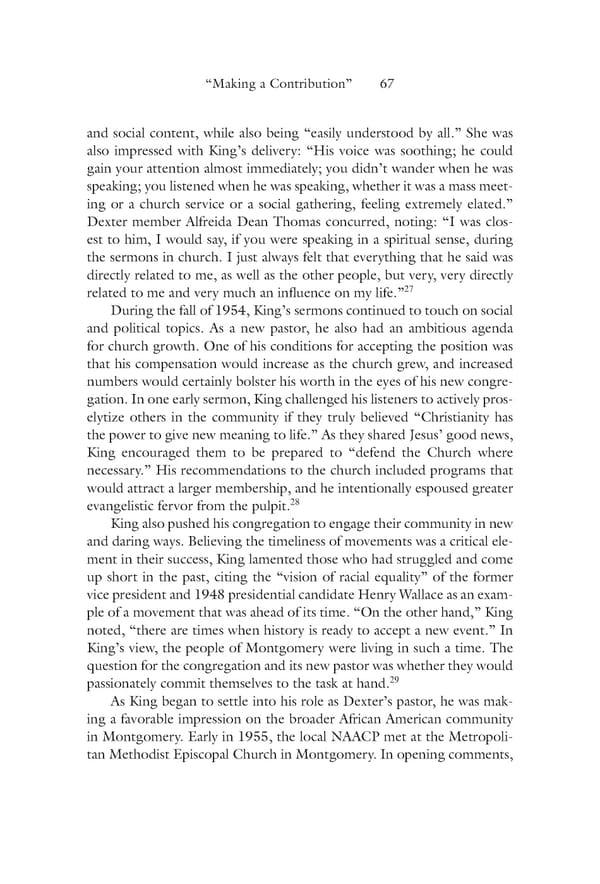“Making a Contribution” 67 and social content, while also being “easily understood by all.” She was also impressed with King’s delivery: “His voice was soothing; he could gain your attention almost immediately; you didn’t wander when he was speaking; you listened when he was speaking, whether it was a mass meet- ing or a church service or a social gathering, feeling extremely elated.” Dexter member Alfreida Dean Thomas concurred, noting: “I was clos- est to him, I would say, if you were speaking in a spiritual sense, during the sermons in church. I just always felt that everything that he said was directly related to me, as well as the other people, but very, very directly 27 related to me and very much an influence on my life.” During the fall of 1954, King’s sermons continued to touch on social and political topics. As a new pastor, he also had an ambitious agenda for church growth. One of his conditions for accepting the position was that his compensation would increase as the church grew, and increased numbers would certainly bolster his worth in the eyes of his new congre- gation. In one early sermon, King challenged his listeners to actively pros- elytize others in the community if they truly believed “Christianity has the power to give new meaning to life.” As they shared Jesus’ good news, King encouraged them to be prepared to “defend the Church where necessary.” His recommendations to the church included programs that would attract a larger membership, and he intentionally espoused greater 28 evangelistic fervor from the pulpit. King also pushed his congregation to engage their community in new and daring ways. Believing the timeliness of movements was a critical ele- ment in their success, King lamented those who had struggled and come up short in the past, citing the “vision of racial equality” of the former vice president and 1948 presidential candidate Henry Wallace as an exam- ple of a movement that was ahead of its time. “On the other hand,” King noted, “there are times when history is ready to accept a new event.” In King’s view, the people of Montgomery were living in such a time. The question for the congregation and its new pastor was whether they would 29 passionately commit themselves to the task at hand. As King began to settle into his role as Dexter’s pastor, he was mak- ing a favorable impression on the broader African American community in Montgomery. Early in 1955, the local NAACP met at the Metropoli- tan Methodist Episcopal Church in Montgomery. In opening comments,
 Becoming King: Martin Luther King Jr. Page 87 Page 89
Becoming King: Martin Luther King Jr. Page 87 Page 89